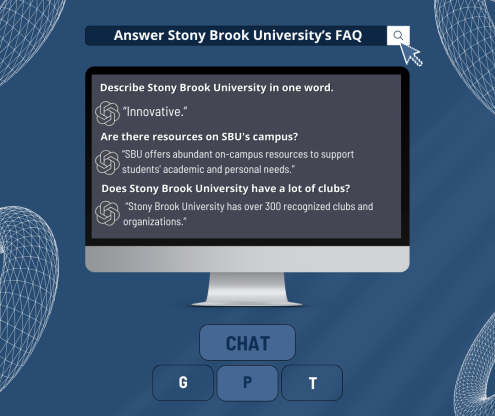
“This is weird.”
Pablo Calvi, an associate professor of Latin American and multimedia journalism at Stony Brook University, was unsettled as he examined one of his student’s pieces of writing; the argument was structured in an entirely different style than their previous works.
Calvi was stunned by what he found as he delved deeper. The piece was produced by ChatGPT, an artificially intelligent (AI) chatbot that generates human-like responses to various prompts. Calvi swiftly conducted further research and discussed solutions with fellow professors upon sensing a looming threat from a possible transformation in the higher education industry. Some university scholars like Calvi are concerned about the risk ChatGPT poses on students who are tempted to commit academic dishonesty, while others perceive its potential to transform the classroom and assist students with limited resources.
Now, the main question is whether ChatGPT poses a threat to the traditional classroom experience, or if it can serve as a valuable tool in facilitating new learning styles.
“If ChatGPT does the math for you, what are students learning?” David Kahn, assistant mathematics professor asked. Despite knowing that students are using ChatGPT, Kahn finds its presence difficult to detect when assigning mathematics problems.
Scholars like Professor Laurent Dubreuil, one of several experts who joined a group of panelists in a talk called “Chat GPT and the Humanities,” expressed concerns about the possibility of students losing critical skills such as writing, analysis and deductive reasoning, as well as how AI softwares like ChatGPT said it exhibited a lack of morality when producing works. Many also feel threatened by ChatGPT’s potential to replace future academic positions. This recent controversy raises a fundamental question: what quality of education are universities providing if AI can easily complete students’ work?
Now it’s time for professors to reflect on whether their teaching methods and curriculums offer students valuable knowledge. To cultivate critical thinking and problem-solving skills, they must embrace innovative teaching techniques that foster creativity.
In response, Kahn placed more emphasis on the importance of holding in-person exams compared to homework assignments. Several professors at Stony Brook University have adapted to the insurgence of AI by assigning students essay prompts that are more challenging, making it harder to utilize ChatGPT.
In reality, ChatGPT is not as efficient as students are led to believe. American professor and public intellectual Noam Chomsky published an opinion piece on the rise of ChatGPT in The New York Times earlier this year. After testing ChatGPT’s responses to various academic questions, he argued that the chatbot lacks “moral thinking” skills and generates answers that are often too broad or too narrow.
“Sometimes ChatGPT gets things right and grammatically correct, but it is confusing in terms of its language structure,” Calvi said.
He also observed that ChatGPT does not consider social contexts like the human brain normally would, as it fails to incorporate previously discussed experiences when writing an email. He believes that ChatGPT’s current limitations may make it more detectable than we think, especially with the assistance of a detection tool developed by students at Stanford University that can differentiate artificial work from student-produced work, titled “ChatGPT Zero.”
However, instead of prohibiting ChatGPT, some university scholars propose different solutions. Wenbo Li, an assistant professor in the School of Communication and Journalism at Stony Brook, initiated his first class discussion by instructing students on how to use ChatGPT in a way that will not violate the University’s policy on academic honesty.
Some institutions also have expressed a positive attitude towards ChatGPT, including the educational non-profit organization Khan Academy, which recently partnered with OpenAI to launch Khanmigo: an artificial intelligence-assisted learning tool based on GPT-4, the most recent language-writing model from the developers at OpenAI.
As they envision it, Khanmigo functions as an AI teaching assistant, helping to provide real-time feedback and one-on-one tutoring for children through online conversations. While the program is currently only available to around 800 educators and students in a small pilot program from its initial launch in March, more than 8,000 teachers and students will test its interactive features in the classroom during the upcoming school year.
While an AI chatbot can function as an educational assistant instead of a ghostwriter, it is not necessary to enforce a ban on ChatGPT. The changes it has already made in how higher education responds to the presence of AI cannot be avoided. Instead, it is crucial to establish new regulations on similar chatbots and create more transparent and safe learning environments by teaching students how to use them properly. In this digital age, it is also essential for students to develop unique human abilities that ChatGPT cannot easily replace in traditional education settings.
If students are able to use ChatGPT in respectable and meaningful ways, it can help generate efficient learning techniques. If educators in our current system are motivated enough, there is no way ChatGPT can’t leave a positive, long-lasting influence in classrooms.












